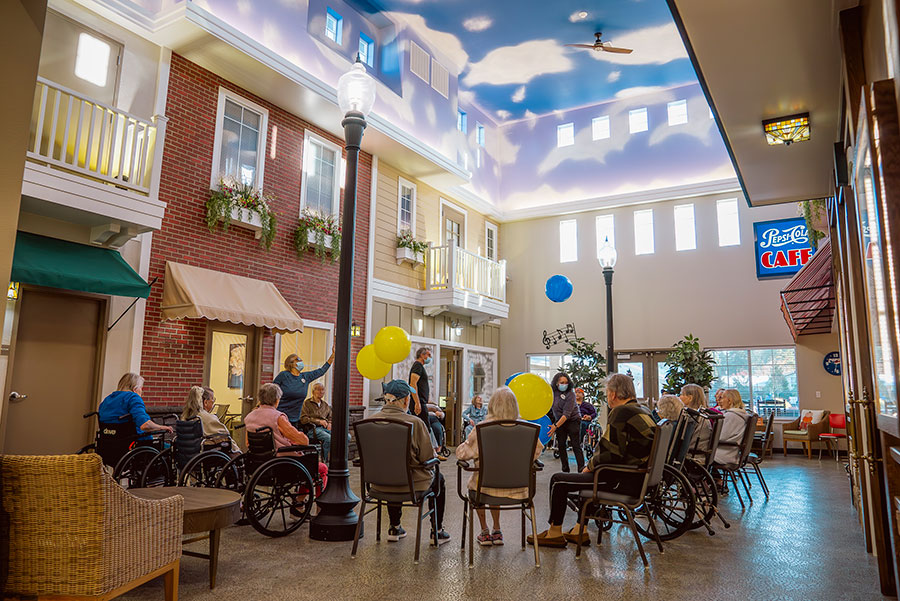Everything About Memory Treatment Solutions: Why Small Memory Care Houses Are a Great Option
Memory care solutions play an important role in supporting people with Alzheimer's and mental deterioration. Small memory treatment homes attract attention for their tailored approach and intimate setting. With lower staff-to-resident ratios, these homes foster stronger connections and customized care. Residents benefit from enhanced social communications and a safe setting. As families discover choices, recognizing the distinct advantages of tiny memory treatment homes ends up being essential. What factors should be taken into consideration when selecting the appropriate home?
Comprehending Memory Care Services
While several may be acquainted with basic senior treatment alternatives, understanding memory care solutions is important for family members facing the difficulties of cognitive decrease. Memory treatment specifically deals with people with conditions such as Alzheimer's disease and various other forms of mental deterioration. These services give a structured atmosphere that focuses on boosting the top quality of life for citizens via specialized treatment and support.Memory care centers are designed to ensure safety and security and safety, frequently featuring protected settings to protect against wandering. Trained personnel are readily available all the time to assist with everyday tasks, drug management, and personal care. Furthermore, memory treatment programs often include cognitive stimulation activities, customized to engage locals and advertise mental health. Families can gain from comprehending these solutions, as they allow informed choices regarding their loved ones' care, ensuring that their details requirements and choices are dealt with in a supportive and caring fashion.
The Benefits of Tiny Memory Care Residences
Small memory treatment homes use unique benefits that can significantly boost the top quality of life for homeowners with cognitive problems. One considerable advantage is the intimate setting, which permits individualized communications among team and homeowners. This smaller sized setting cultivates purposeful relationships, reducing sensations of seclusion and stress and anxiety often experienced by individuals with memory issues.Additionally, the lower staff-to-resident proportion in little memory treatment homes allows caretakers to provide even more attentive guidance and assistance. This approach not only boosts security but likewise advertises a complacency for the residents.Moreover, tiny memory care homes can adjust promptly to the unique needs and choices of each homeowner, enabling a much more homey atmosphere. Such a setting can encourage social interaction and engagement in tasks, inevitably enhancing the day-to-day experiences of those coping with cognitive problems.
Personalized Care Plans for Residents
Individualized treatment strategies are essential in memory care homes, as they deal with the distinct needs and preferences of each citizen. These strategies start with comprehensive evaluations carried out by experienced experts, who assess cognitive abilities, medical history, and individual interests. This tailored approach guarantees that care is not just effective but likewise respectful of each person's dignity and autonomy.Moreover, personalized treatment plans are versatile, enabling adjustments as locals' requirements advance in time. This versatility cultivates a complacency and familiarity, which is necessary for people living with memory obstacles. Caretakers are educated to carry out these plans regularly, supplying assistance that aligns with the citizens' regimens and preferences.Ultimately, customized treatment strategies improve the lifestyle for locals by advertising wellness, independence, and interaction, making them a basic element of memory care services in little memory care homes.
Creating a Home-Like Atmosphere
Developing a home-like atmosphere is critical for cultivating convenience and familiarity in memory treatment setups, as it significantly influences citizens' psychological health. Small memory treatment homes commonly prioritize individualized touches, such as cozy shade schemes, family images, and acquainted furniture plans, which assist locals really feel much more at simplicity. Incorporating aspects reminiscent of a standard home, like comfy space and communal locations, encourages a sense of belonging.Moreover, making use of natural light and outside rooms can enhance the atmosphere, advertising relaxation and serenity. Team member play a significant duty in preserving this environment by involving with homeowners in a compassionate way, treating them like household. Routine activities, such as food preparation or horticulture, can additionally add to a home-like feeling, offering possibilities for residents to participate in significant experiences. In general, developing a nurturing atmosphere sustains cognitive function and psychological security, making it a crucial element of memory treatment services.
Improved Social Communication and Neighborhood
Enhanced social interaction and area are vital components of memory treatment services. By promoting personalized social interaction and creating a family-like atmosphere, these services promote significant links among locals. Team activities and events further encourage engagement, aiding people really feel more consisted of and sustained.
Individualized Social Engagement
While social interaction is vital for general well-being, numerous people with memory disabilities frequently have a hard time to involve meaningfully with others. Customized social engagement in memory care homes addresses this difficulty by developing customized tasks that satisfy locals' distinct interests and abilities. By concentrating on individual preferences, caretakers can cultivate links that resonate deeply with each individual. Activities such as art therapy, music sessions, and assisted discussions advertise cognitive excitement and emotional expression. In addition, small group settings motivate friendship and enable for even more intimate interactions, enhancing sensations of belonging. This approach not only combats feelings of isolation but additionally encourages citizens to keep a feeling of identification, eventually contributing to enhanced mental health and high quality of life.
Family-like Ambience
In a memory care setup, fostering a family-like ambience greatly boosts social interaction and builds a sense of neighborhood among locals. Smaller memory treatment homes commonly prioritize intimate environments, permitting residents to form closer links with one another and personnel. This nurturing environment advertises depend on, which is essential for people with memory disabilities. Citizens are more probable to involve in discussions and share experiences, producing an encouraging network that minimizes sensations of isolation. The familiarity of shared areas and regimens adds to a feeling of belonging, better urging social interaction (personalized memory care). In such setups, emotional bonds thrive, leading to enhanced overall wellness and a better of life for locals as they navigate their day-to-day experiences together
Group Activities and Occasions

Safety And Security and Protection Features in Little Homes
Many little homes made for memory treatment include important security and safety and security features to ensure the well-being of residents. These homes frequently use safe entry and departure indicate avoid straying, a common worry amongst people with memory problems. Additionally, security systems and alarm system systems enhance surveillance, making certain that staff can without delay react to any uncommon activities.Interior formats are tailored for safety and security, with lessened dangers such as sharp corners and clutter-free pathways. Handrails and non-slip flooring are generally set up to lower the risk of falls. Team members are trained in emergency protocols, ensuring they are prepared for different situations.Moreover, individualized treatment strategies may include assessment of individual safety demands, supplying customized remedies for every homeowner. Overall, my website these safety and security and security attributes create a caring setting where homeowners can prosper while maintaining their dignity and freedom.
Just how to Choose the Right Memory Care Home
How can family members guarantee they pick the most appropriate memory treatment home for their loved ones? The decision calls for careful consideration of numerous factors. Family members ought to evaluate the center's personnel qualifications and training, ensuring that caregivers are experienced in handling memory-related conditions. Next off, it's important to evaluate the home's environment, concentrating on security features and whether it cultivates a sense of community and belonging. Visiting the center can give understanding into daily activities and the social environment, which are crucial for psychological stimulation and psychological wellness. Additionally, families need to make inquiries about the care strategies offered, ensuring they are customized to individual needs. Ultimately, taking into consideration the home's place and accessibility for family brows through can contribute to a smoother change. By resolving these facets, families can make an educated choice that prioritizes their liked one's convenience and lifestyle in a memory treatment setup.
Frequently Asked Concerns
What Credentials Should Personnel Members in Memory Care Homes Have?
Personnel in memory treatment homes should possess relevant accreditations, experience in dementia care, solid communication skills, and compassion. Recurring training in behavior management and therapeutic interventions boosts their ability to support homeowners efficiently.
How Do Memory Care Services Differ From Typical Assisted Living?
Memory treatment services concentrate specifically on people with memory impairments, providing specific support and organized environments. In comparison, traditional assisted living supplies basic aid with daily tasks, doing not have the customized strategy necessary for those with cognitive challenges.
What Sorts of Tasks Are Provided in Memory Treatment Homes?
Memory treatment homes commonly offer a variety of tasks developed to engage homeowners. Typical alternatives consist of art treatment, songs sessions, cognitive video games, workouts, gardening, and get-togethers, all targeted at boosting health and cognitive function.
Can Residents Bring Their Own Items to Memory Treatment Residences?
Citizens can generally bring their very own possessions to memory care homes, permitting them to customize their space - personalized memory care. This technique assists develop a familiar environment, advertising comfort and a feeling of identification for the people

Exactly How Are Family Members Participants Associated With the Treatment Refine?
Household members play an essential function in the care procedure, typically taking part in decision-making, participating in care meetings, and giving emotional assistance. visit this web-site Their participation cultivates a collaborative environment, improving the homeowner's total well-being and lifestyle. While numerous may be acquainted with basic elderly treatment choices, understanding memory treatment services is important for families dealing with the challenges of cognitive decrease. These solutions offer a structured environment that concentrates on boosting the top quality of life for locals with specialized care and support.Memory treatment centers are made to assure security and protection, commonly including secured environments to prevent wandering. Customized care plans are crucial in memory treatment homes, as they provide to the special requirements and choices of each local. Personnel participants in memory care homes ought to possess relevant certifications, experience in dementia treatment, solid interaction skills, and compassion. Memory care services concentrate specifically on people with memory problems, offering specialized support and organized environments.